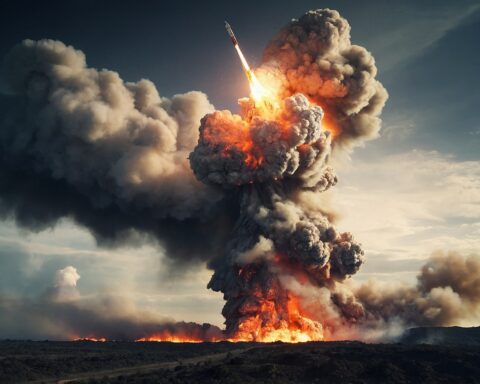Last Updated on November 7, 2024 9:26 am by Laszlo Szabo / NowadAIs | Published on November 7, 2024 by Laszlo Szabo / NowadAIs
Scale AI’s Defense Llama: The New Secret Weapon for National Security – Key Notes:
- Scale AI has developed a groundbreaking AI assistant called Defense Llama, designed specifically for the U.S. military and national security agencies.
- Defense Llama is built on Meta’s Llama 3 model and is capable of assisting with a wide range of military operations, from combat planning to intelligence analysis.
- The Department of Defense (DoD) recognized the need to harness the power of generative AI technologies, leading to the creation of a task force to explore their effective implementation.
Scale AI’s Defense Llama, the AI Ally Empowering Military Leaders
Ever wondered what would happen if you combined the brainpower of artificial intelligence with military strategy? Well, wonder no more! Scale AI has created something fascinating called Defense Llama, and it’s changing how our military thinks and plans. But don’t worry – this isn’t your typical boring tech story. Let me tell you why this matters to all of us.
What in the World is a Defense Llama? (And No, It Doesn’t Spit!)

Picture having the world’s smartest military advisor in your pocket – one that never sleeps, never gets tired, and can process information faster than you can say “national security.” That’s Defense Llama in a nutshell. Built by Scale AI using Meta’s Llama 3 technology, it’s like having a military genius on speed dial, except this one runs on algorithms instead of coffee.
But here’s where it gets interesting: unlike regular AI chatbots that might get squeamish about discussing military matters, Defense Llama is specifically designed to handle the tough stuff. It’s like the difference between asking your regular friend for advice versus talking to someone who actually knows what they’re talking about!
Why Did We Need This Again?
Let’s be real – the world isn’t getting any simpler. Military decisions that used to take days or weeks of planning sometimes need to be made in hours or even minutes. It’s like trying to solve a thousand-piece puzzle while someone’s counting down the seconds. That’s exactly why the Department of Defense thought, “Hey, maybe we need some AI backup here!”
Think about it: while other countries are racing to develop their own military AI capabilities, did you want the U.S. to be left twiddling its thumbs? Neither did the DoD! They created a special task force just to figure out how to use these new AI technologies effectively. Talk about not bringing a knife to a gunfight!
The Inside Scoop: A Peek Behind the Curtain
“We are still looking at ways to provide more enterprise support, especially as things like the NSM that was just released. That’s one of the areas that we’re leaning forward on being able to try and help support the DOD’s adoption of this technology, again, in a responsible manner”
Recently, Dan Tadross (who wears two hats as Scale AI’s head of federal delivery and a Marine Corps reservist) gave us a behind-the-scenes look at Defense Llama. During a demo at Scale AI’s Washington office, he showed how some military groups are already putting this tech to work on their secure networks.
Here’s what makes it special: while regular AI might respond to military questions with “Let’s all be friends and talk it out,” Defense Llama actually understands the realities of military operations. It’s like the difference between asking a pacifist monk and a chess grandmaster about strategy – both might be smart, but you probably want the chess player’s advice for tactical decisions!
The Secret Sauce: Training a Military Mind
You might be wondering how they turned a regular AI into a military expert. Think of it like sending someone to a very specialized school. Defense Llama didn’t just read military manuals – it learned from a carefully curated mix of military doctrine and international humanitarian law.
But here’s the clever part: they had to teach it balance. It needed to understand when to suggest tactical options versus when diplomatic solutions might work better. It’s like teaching someone to be both a warrior and a diplomat – not an easy feat!
What This Means for the Future
Imagine a military where decisions that used to require rooms full of analysts can now be handled by a small team with Defense Llama’s help. It’s like going from a library full of books to having all human knowledge in your smartphone – except this time, it’s military expertise we’re talking about.
Tadross sees a future where military planning becomes more efficient and effective. Instead of drowning in data, personnel can quickly get the insights they need. Think of it as having a really smart intern who’s somehow read every military document ever written and can instantly recall any piece of information.
The Bottom Line: Why Should We Care?
Here’s why this matters to everyone: in a world where threats can emerge at lightning speed, having tools that help our military make smart, informed decisions quickly isn’t just nice to have – it’s necessary. Defense Llama isn’t about replacing human judgment; it’s about giving our military personnel the best possible support to make crucial decisions.
Think of it this way: if you were playing chess against a grandmaster, wouldn’t you want a really smart AI advisor in your corner? That’s essentially what Defense Llama brings to national security – except the stakes are much higher than winning or losing a game.
Looking Ahead
As AI continues to evolve, tools like Defense Llama will likely become as common in AI military operations as maps and radios. It’s not about creating Skynet or replacing human decision-makers – it’s about giving our military the best tools possible to handle increasingly complex challenges.
The next time you hear about AI in the military, remember: it’s not all robots and science fiction. Sometimes it’s just about having a really smart digital assistant who knows its stuff when it comes to keeping us safe. And who knows? Maybe one day we’ll look back at Defense Llama as the beginning of a whole new era in military planning and strategy.
Descriptions
Terms that need explanation:
- Large Language Model (LLM): A type of artificial intelligence that is trained on a vast amount of text data, allowing it to generate human-like responses and perform various language-related tasks.
- Fine-tuning: The process of further training a pre-existing AI model, such as Llama 3, to specialize it for a specific domain or task, in this case, military applications.
- Generative AI: A type of artificial intelligence that can create new content, such as text, images, or audio, based on the input it receives.
- International Humanitarian Law: A set of rules and principles that aim to protect people who are not or are no longer participating in hostilities, such as civilians, and to restrict the means and methods of warfare.
Frequently Asked Questions
- What is Scale AI’s Defense Llama, and how does it work?
Scale AI’s Defense Llama is a cutting-edge AI assistant developed specifically for the U.S. military and national security agencies. It is built on Meta’s Llama 3 model and has been fine-tuned by Scale AI to provide expert-level support for a wide range of military operations, from combat planning to intelligence analysis. The Defense Llama is capable of processing vast amounts of data and providing detailed, context-appropriate responses to complex questions, helping military leaders make informed decisions quickly and efficiently. - How does Defense Llama differ from regular AI assistants?
Unlike general-purpose AI chatbots, Defense Llama is designed with the unique needs of the military in mind. While regular AI assistants may struggle with providing suitable responses to military-specific inquiries, often defaulting to diplomatic solutions, Defense Llama has been trained using a carefully curated mix of military doctrine and international humanitarian law. This allows it to understand the nuances of military strategy and tactics, and to offer tailored, actionable insights that align with the specific requirements of the armed forces. - What are the key benefits of using Defense Llama in military operations?
The primary benefit of using Defense Llama is its ability to streamline decision-making processes for military planners and strategists. By providing quick access to a wealth of military knowledge and expertise, Defense Llama helps reduce the time and resources needed to gather and synthesize information. This, in turn, allows for faster and more informed decision-making, which can be crucial in rapidly evolving high-stakes scenarios. Additionally, Defense Llama’s capabilities can help minimize the risk of civilian casualties and collateral damage by providing insights on the most appropriate tactics and munitions to use. - How is Defense Llama being used by the military, and what are the plans for its future development?
While the specific details of Defense Llama’s current military deployments are not publicly disclosed, it is known that certain military groups are already using the AI assistant on secure networks. The Department of Defense (DoD) has recognized the importance of harnessing the power of generative AI technologies, and the creation of the Defense Llama is a testament to their efforts. Going forward, it is likely that Defense Llama’s capabilities will continue to be refined and expanded, potentially incorporating additional military-specific knowledge and decision-support features to further enhance the efficiency and effectiveness of military operations. - What are the ethical considerations surrounding the use of AI in military applications?
The use of AI in military applications raises important ethical concerns that must be carefully addressed. While tools like Defense Llama can provide valuable support to military decision-makers, there are legitimate worries about the potential for misuse or unintended consequences. The Scale AI team has emphasized the importance of incorporating safeguards and ethical guidelines into the development of Defense Llama, ensuring that it does not enable or encourage unlawful or unethical military actions. Ongoing monitoring and transparent oversight will be crucial to ensure that the use of this technology aligns with international humanitarian law and the principles of just and proportionate use of force.












